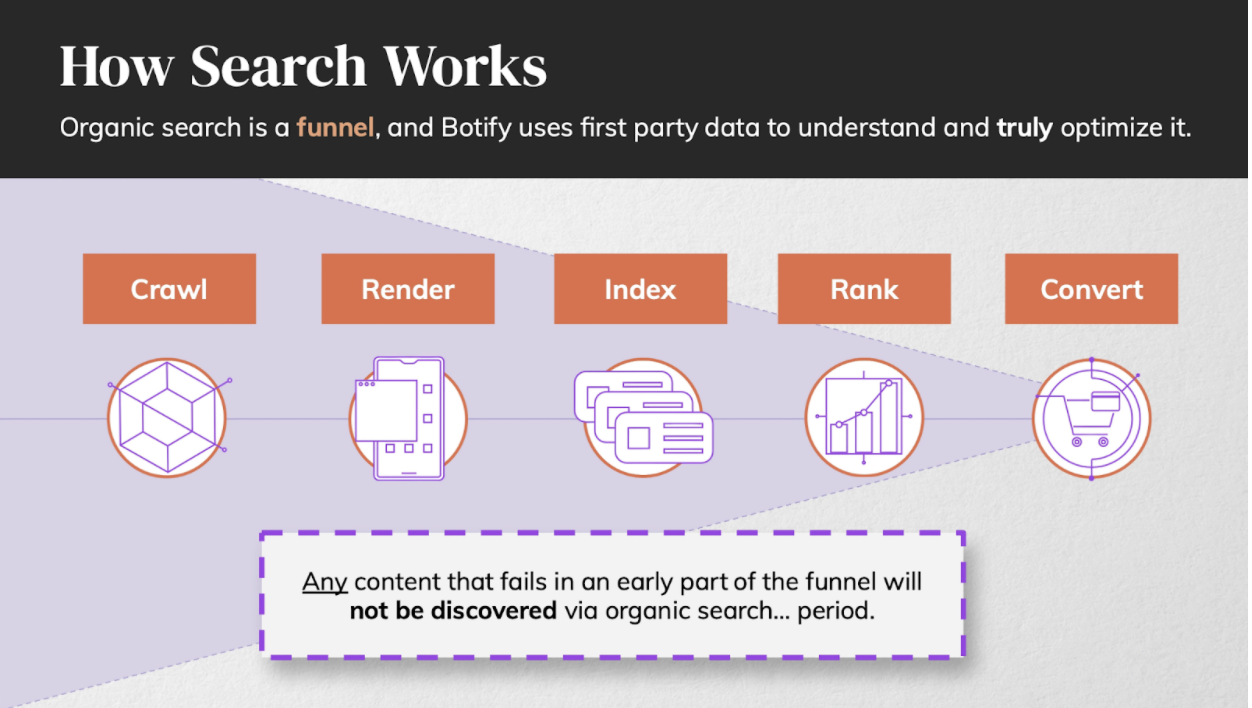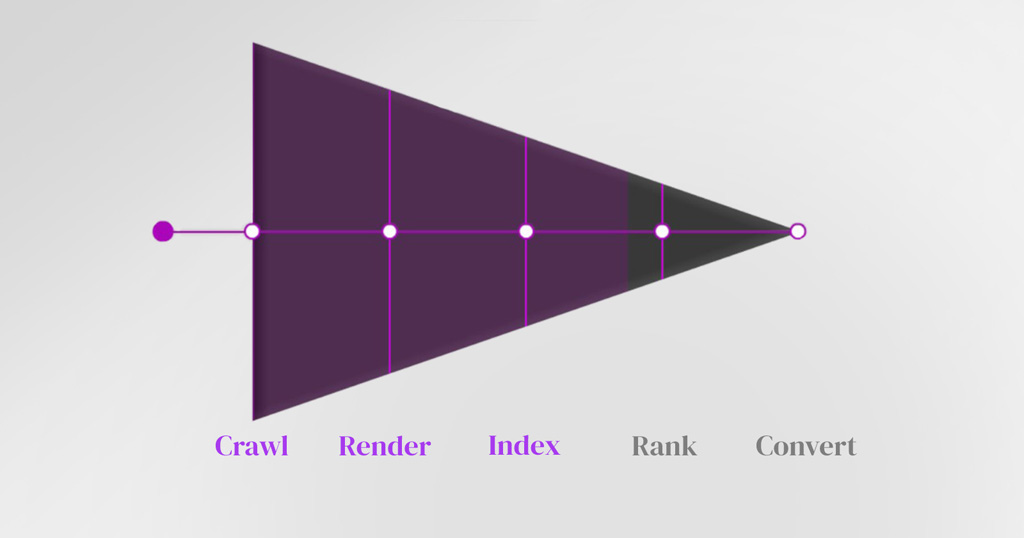SEO can mean different things to different organizations.
For some, it means finding the most searched keywords, finding keywords related to those keywords, and creating content for those keywords. You then monitor how you’re ranking for those keywords and optimize over time.
At the same time, you keep creating content to help “snowball” the growth of your SEO program. Depending on the size or type of your site, you may spend a lot of time optimizing product pages to new keywords or even creating landing pages to attract new customers.
This strategy works well for many websites; however, this strategy isn’t sustainable when you’re an enterprise organization. No matter how large your headcount might be, it can still be challenging to keep up with new keywords and optimize individual product pages versus page templates.
Rank tracking, specifically, can be difficult as there are so many keywords and URLs to keep track of.
While smaller organizations have no trouble keeping up with the rank of their most valuable keywords, enterprises are often challenged with staying at the top of Google for hundreds of thousands of keywords.
Let’s address some of the common problems enterprise organizations face when it comes to rank tracking and how to solve them.
Challenges With Rank Tracking For Enterprises
The bigger your website, the more complicated rank tracking is for four key reasons:
1. Rank Tracking Is Difficult To Scale
Many enterprise websites are enormous. For example, think about an e-commerce site with 8 million indexed URLs or a news/media site that publishes 100 new articles every day. When you consider that a single URL can rank for multiple keywords (sometimes hundreds!), this can quickly get out of hand.
So how can you routinely monitor that many keywords, especially when rank can change day-to-day for a wide variety of reasons? Even worse, how can you optimize individual pages for keywords with that many pages on your site?
2. Rank Tracking Is Difficult To Maintain
Rank tracking typically comes from keyword research, a process in which you determine what phrases your audience is using to search for the information or products you offer. Unfortunately, this process can be long and cumbersome, especially for enterprises that want visibility for millions of different keywords.
Because of this, keyword research is usually treated as a “set it and forget it” project, or at best, something that’s done quarterly or annually.
If you only perform keyword research once, or very infrequently, you’ll miss out on tracking new keywords that your site is gaining impressions and clicks for. Especially in an increasingly digital world, there is a lot of risk in not seeing recent trends more frequently.
3. Rank Tracking Doesn’t Provide All The Valuable Details
Enterprise organizations often want more granularity than most rank tracking solutions can provide them.
Many rank tracking solutions will tell you what position you’re ranking in for your selected keywords but can’t give you any additional details like how many clicks you’re getting for those rankings. This is because most rank tracking solutions scrape Google search result pages to calculate rank position rather than use real searcher or actual website data.
4. Rank Tracking Is Missing a Lot of Context
Similar to the problem of lacking details is the issue of missing context. Enterprise organizations need to know not only what positions they’re ranking in but why they’re ranking there. Are they performing well, or is there a technical issue that’s preventing them from ranking better?
Without that context, you’ll have little to go off of when it comes to taking action.
So how can you solve the challenges of rank tracking for large enterprise websites? You go beyond rank tracking alone and incorporate more technical SEO elements into your strategy.
Enterprise SEO: How To Go Beyond Rank Tracking
Discoverability Is More Important Than Any Keyword
Enterprise websites need to focus on tactics and changes that allow them the most significant success across a larger body of pages than a smaller website. A full-funnel approach to SEO often yields the most important result as it impacts the website’s overall performance instead of individual keywords.
For large websites, this is invaluable. Starting with technical SEO ensures your site can be crawled, rendered, and indexed. The most crucial element of this SEO funnel is discoverability.
In order to rank in Google or any other search engine, your content needs to be crawlable and indexable. However, as much as 50% of content on a large enterprise website isn’t visible to search engines (per Botify CEO Adrien Menard).
That means that no amount of on-page content changes or keyword research will help you get additional organic conversions if Google can’t even get to your content.
Technical SEO Can Drive Impact
Because search is a process, technical issues can impact keyword performance. For example, take a look at all these technical issues below that can cause poor ranking performance and notice that none of them have to do with on-page optimization like content and keywords:
- A page isn’t ranking because Google hasn’t crawled it.
- A page isn’t ranking because Google hasn’t crawled it recently.
- A page isn’t ranking because we’re not linking to it anywhere on the site.
- A page isn’t ranking because it canonicalizes to a different URL.
- A page isn’t ranking because it has a noindex tag on it.
- A page isn’t ranking because it doesn’t have a 200 status code.
- A page isn’t ranking because it is too deep in the overall site structure.
- A page isn’t ranking because the robot.txt file is blocking it from being crawled.
Rank tracking won’t tell you what the problems are, either — it can only tell you that you’re still not ranking for a given keyword.
Content that search engines can’t discover is generally plagued with some sort of technical issue such as:
- JavaScript.
- Incorrect robot.txt files.
- CSS scripts blocking essential resources.
- Issues with crawl budgets.
- Duplicate content.
- Poorly configured .htaccess files.
- Rendering difficulties.
- Site architecture challenges.
Solving these issues is especially important for enterprise SEO because they can affect full site performance or performance across a specific template.
That means that keyword rankings can dramatically shift for thousands of keywords instead of optimizing for just a handful. Therefore, technical SEO should play a significant role in your organic search strategy.
After all, if the spiders can’t crawl your content, your human users can’t find it from organic search.

Brands that prioritize SEO are much more likely to find that investment profitable (91%). The top benefits included increased sales (65%) resulting from greater conversions (62%), according to Forrester Consulting research commissioned by Botify.
First-Party Data Is King
For enterprise websites, you must have insight into the entire organic search funnel; specifically, your first-party data.
Google Search Console lets you know what keywords you appeared for, your average position for those keywords, and which content pages rank in those positions. This information is invaluable in deciding which keywords provide clicks and which specific pages to optimize to rank higher for individual keywords or keyword groups.
In addition, and most importantly, GSC provides content creators and SEOs with a roadmap to achieving that pivotal search position in the SERPs. That said, it can still be a lot of data to dig through when you have a large website.
However, with a tool like Botify, you can import from numerous data sources, including our industry-leading site crawler, customers’ server logs, search data from Google Search Console accounts, and business/conversion data.
Then, we cross-index this data to derive higher quality insights and report things you literally couldn’t see from just one data source. This allows you to see beyond just what a group of keywords is ranking for and instead see the true business impact of those keywords, rather than just their current position in Google.
This combination of data allows you to unlock your website’s true potential at scale and create sustainable impacts on revenue.
Realize Greater Revenue
by Prioritizing SEO
The opinions expressed in this article are the sponsor's own.



